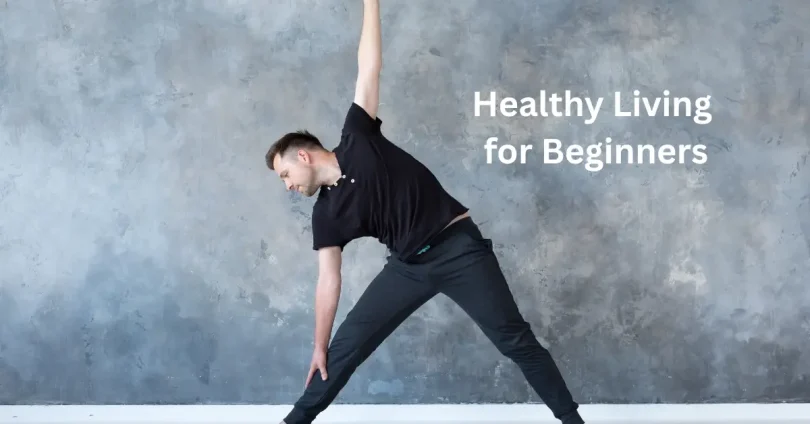Taking the first step towards a healthier lifestyle can feel overwhelming. With so much conflicting advice, endless diet fads, and fitness trends dominating the internet, it’s hard to know where to begin. But here’s the truth—living a healthier life doesn’t have to be complicated. It’s about making small, consistent changes that lead to long-term benefits for your body and mind. Whether you’re a student, a professional, a busy parent, or simply someone ready to take control of their well-being, this guide is your friendly roadmap to Healthy Living for Beginners.
What is Healthy Living?

Healthy living means taking care of your body, mind, and emotions through lifestyle choices that improve your overall well-being. It’s a balance of nutrition, physical activity, mental health, sleep, and avoiding harmful habits. When practiced consistently, healthy living can prevent chronic diseases, boost mood, increase energy, and improve quality of life.
Healthy living is not about perfection. It’s about creating habits that work for your unique lifestyle and circumstances. It includes learning to listen to your body, understanding your mental and emotional needs, and adapting over time. It also means developing routines that support both short-term well-being and long-term health.
Key Components of a Healthy Lifestyle:
- Balanced Nutrition: Eating a variety of whole, nutrient-dense foods gives your body the fuel it needs to function at its best. It also helps with digestion, immune support, and energy levels.
- Physical Activity: Regular exercise keeps your heart healthy, strengthens muscles and bones, and improves your mood by releasing endorphins.
- Mental Well-Being: Mental health influences your relationships, job performance, and overall life satisfaction. Managing stress and practicing mindfulness are essential.
- Quality Sleep: Poor sleep affects nearly every system in your body. Prioritizing sleep supports memory, immune strength, and emotional balance.
- Avoiding Harmful Habits: Stepping away from smoking, excessive alcohol, and sedentary behavior reduces the risk of diseases and improves longevity.
Nutrition Basics for Beginners
Understanding Macronutrients and Micronutrients
Proper nutrition is foundational to good health. When you understand the basics of what your body needs, you can make smarter food choices that energize and nourish you.
- Macronutrients: Include carbohydrates, proteins, and fats. These provide energy and are essential for bodily functions.
- Carbohydrates: Found in whole grains, fruits, vegetables, and legumes. Choose complex carbs for sustained energy and blood sugar balance.
- Proteins: Essential for muscle repair and growth. Also important for enzymes, hormones, and immune function. Sources include lean meats, dairy, legumes, and nuts.
- Fats: Healthy fats like those from avocados, nuts, seeds, and olive oil support brain health, hormone production, and nutrient absorption.
- Micronutrients: Include vitamins and minerals such as vitamin C, iron, calcium, magnesium, and potassium. These are found in fruits, vegetables, whole grains, and lean proteins. Deficiencies can lead to fatigue, weakened immunity, and poor health outcomes.
Building a Balanced Plate
Creating balanced meals ensures you get a mix of nutrients at every meal.
- Half your plate should be fruits and vegetables, rich in fiber, vitamins, and antioxidants.
- One-quarter should be whole grains (like brown rice, quinoa, or oats), which provide fiber and sustained energy.
- One-quarter should be protein (like chicken, fish, tofu, lentils, or eggs), to support muscle and body repair.
- Add a small serving of healthy fat (like olive oil, chia seeds, or avocado) for fullness and brain function.
- Don’t forget to add herbs and spices for flavor and extra health benefits like anti-inflammatory properties.
Meal Planning Tips for Beginners
- Plan your meals ahead of time to avoid last-minute unhealthy choices.
- Batch cook staples like rice, beans, roasted vegetables, and grilled proteins to save time.
- Keep healthy snacks like fruits, boiled eggs, hummus, yogurt, or nuts handy to curb cravings.
- Avoid sugary drinks—opt for herbal teas, infused water, or sparkling water.
- Keep a grocery list to stay focused and reduce impulse purchases.
Getting Started with Exercise

Why Exercise Matters
Exercise plays a critical role in health. It not only helps with weight management but also:
- Improves cardiovascular health
- Enhances brain function and memory
- Strengthens bones and muscles
- Boosts mood and reduces anxiety and depression
- Helps regulate blood sugar and insulin levels
- Improves sleep quality and energy levels
Ready to stop wondering and start knowing? Let’s dive in.
Transform Life with These Daily Habits for Healthy Living
Unlock Wellness with Simple Healthy Lifestyle Changes
Ultimate Guide to Healthy Living for a Vibrant Life
Powerful Healthy Living Tips for a Better, Happier Life
Types of Exercise
- Cardio (Aerobic): Walking, running, cycling, swimming, and dancing are great for heart and lung health. They also burn calories and improve stamina.
- Strength Training: Includes lifting weights, using resistance bands, or bodyweight movements like push-ups and squats. These build muscle and strengthen bones.
- Flexibility and Balance: Yoga, stretching, and tai chi help improve posture, reduce injury risk, and enhance overall movement.
Beginner Workout Plan
- Start Slow: Begin with 15–30 minutes of low-impact activity such as brisk walking, 3–4 times per week.
- Mix It Up: Try a combination of cardio (e.g., walking), strength (e.g., bodyweight squats), and flexibility (e.g., stretching).
- Listen to Your Body: It’s normal to feel sore at first, but you shouldn’t feel pain. Rest is as important as movement.
- Stay Consistent: Create a realistic weekly workout plan and schedule it like an appointment.
Mental Wellness and Stress Management
Importance of Mental Health
Mental health affects how we think, feel, and act. It’s essential for coping with the stresses of life, maintaining relationships, and achieving personal goals.
- Poor mental health can lead to fatigue, irritability, sleep issues, and even physical illness.
- Good mental well-being helps build resilience, manage emotions, and stay focused.
Simple Ways to Improve Mental Well-Being
- Mindfulness and Meditation: Start with a guided meditation app or practice deep breathing for a few minutes a day.
- Gratitude Journaling: Helps shift your focus from negative to positive. Write things you’re thankful for every evening.
- Stay Connected: Isolation can worsen mental health. Schedule time with friends and family or join a community group.
- Limit Screen Time: Too much screen time—especially social media—can affect self-esteem and sleep. Take regular digital breaks.
- Seek Help When Needed: Therapy and counseling are powerful tools for growth and healing.
Sleep Hygiene for Better Rest
Why Sleep Matters
Sleep is the foundation of health. While we sleep, our bodies repair tissue, consolidate memories, and regulate hormones.
- Poor sleep can lead to weight gain, poor concentration, and higher stress.
- Quality sleep improves mood, cognitive function, and immune defense.
Tips for Better Sleep
- Create a Sleep Routine: Your body thrives on routine. Stick to a consistent bedtime and wake-up time, even on weekends.
- Limit Caffeine and Heavy Meals Before Bed: Caffeine can stay in your system for hours. Opt for herbal tea instead.
- Create a Restful Environment: Use blackout curtains, white noise machines, and calming scents like lavender.
- Avoid Screens Before Bed: Blue light from phones and TVs interferes with melatonin production. Read a book or journal instead.
- Practice Relaxation Techniques: Gentle yoga, progressive muscle relaxation, or a warm bath can help you unwind.
Breaking Bad Habits
Common Unhealthy Habits
- Smoking and vaping
- Excessive alcohol consumption
- Sitting for long periods without moving
- Overeating or emotional eating
- High intake of sugar, salt, and processed foods
- Constant exposure to negative media or stressful environments
How to Replace Them with Positive Habits
- Identify Triggers: What causes the unhealthy behavior? Boredom, stress, social settings?
- Find Healthy Replacements: Replace soda with sparkling water, or scrolling with a short walk.
- Make Gradual Changes: Cutting down little by little is more sustainable than quitting cold turkey.
- Celebrate Progress: Acknowledge improvements and reward yourself with something meaningful (non-food rewards).
- Use Accountability: Share your goals with someone or join a support group.
Staying Motivated on Your Health Journey
Goal-Setting Tips
- Start Small: Choose goals that are realistic and achievable.
- Be Specific: Rather than “eat better,” say “eat a vegetable with every meal.”
- Track Progress: Use a habit tracker or journal. Visual progress can be very motivating.
- Adjust as Needed: Flexibility is important. Life happens—don’t give up if you miss a day or two.
- Reward Yourself: Recognize effort and success with non-food rewards like a spa day, new book, or quality time.
Building a Supportive Environment
- Find Your Tribe: Join online communities or in-person groups with similar goals.
- Communicate Your Goals: Let loved ones know what you’re working on so they can support you.
- Create a Healthy Space: Keep healthy food visible and workout gear accessible.
- Practice Self-Compassion: Speak to yourself kindly, especially when things don’t go perfectly.
Latest Trends and Tips in Healthy Living (2025 Update)
Popular Practices Among Beginners
- Digital Detoxes: Disconnecting from devices for hours or full days improves focus, mood, and sleep quality.
- Intuitive Eating: Encourages mindful eating based on hunger cues rather than calorie counting. It fosters a healthier relationship with food.
- Micro Workouts: Short bursts of movement throughout the day keep energy levels stable and reduce sedentary time.
- Plant-Forward Diets: Center meals around vegetables, fruits, grains, and legumes with moderate animal products for flexibility and sustainability.
- Wellness Retreats: Short getaways focused on yoga, nutrition, and mindfulness are growing in popularity.
Wellness Tools You Can Try
- Fitness Trackers: Devices that monitor steps, sleep, heart rate, and calories.
- Meditation and Sleep Apps: Help guide relaxation, reduce anxiety, and promote better sleep.
- Online Workout Platforms: Offer flexibility and variety from home, including live and on-demand classes.
- Healthy Meal Delivery Services: Offer nutritious, pre-portioned meals tailored to different dietary needs.
- Health Coaching Apps: Provide daily tips, habit reminders, and coaching support.
Final Thoughts
Beginning your health journey doesn’t mean you need to be perfect. It’s about progress, not perfection. With the right mindset, support, and steps, you can unlock a life full of energy, clarity, and joy. Embrace the small wins, stay curious, and be kind to yourself along the way. No matter where you start, Healthy Living for Beginners can lead you to lasting transformation and well-being.
FAQs
What’s the first step to healthy living for beginners?
Start with small, manageable changes like drinking more water, walking daily, or adding more vegetables to meals. Consistency matters more than perfection.
How much exercise should a beginner do?
Aim for at least 150 minutes of moderate activity per week. Beginners can start with 15–30 minutes a day, a few days a week, and increase gradually.
Can I eat snacks and still be healthy?
Yes! Choose nutritious snacks like fruit, nuts, yogurt, or veggies with hummus. Healthy snacks keep your energy stable and prevent overeating.
What if I don’t have time to cook?
Prepare simple meals with whole ingredients. Batch cooking on weekends or using healthy meal delivery kits can save time and make eating healthy easier.
How do I stay motivated in my health journey?
Set realistic goals, track your progress, find a support system, and celebrate small wins. Focus on how you feel rather than just results.




